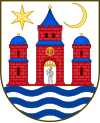Portal:European Union
Introduction
The European Union (EU) is a supranational political and economic union of 27 member states that are located primarily in Europe. The Union has a total area of 4,233,255 km2 (1,634,469 sq mi) and an estimated total population of over 449 million. The EU has often been described as a sui generis political entity combining the characteristics of both a federation and a confederation. Containing 5.8% of the world population in 2020, EU member states generated a nominal gross domestic product (GDP) of around US$16.6 trillion in 2022, constituting approximately one sixth of global nominal GDP. Additionally, all EU states except Bulgaria have a very high Human Development Index according to the United Nations Development Programme. Its cornerstone, the Customs Union, paved the way to establishing an internal single market based on standardised legal framework and legislation that applies in all member states in those matters, and only those matters, where the states have agreed to act as one. EU policies aim to ensure the free movement of people, goods, services and capital within the internal market; enact legislation in justice and home affairs; and maintain common policies on trade, agriculture, fisheries and regional development. Passport controls have been abolished for travel within the Schengen Area. The eurozone is a group composed of the 20 EU member states that have fully implemented the economic and monetary union and use the euro currency. Through the Common Foreign and Security Policy, the union has developed a role in external relations and defence. It maintains permanent diplomatic missions throughout the world and represents itself at the United Nations, the World Trade Organization, the G7 and the G20. Due to its global influence, the European Union has been described by some scholars as an emerging superpower. In 2012, the EU was awarded the Nobel Peace Prize. The United Kingdom became the only member state to leave the EU, in 2020; ten countries are aspiring or negotiating to join it. (Full article...) Selected article The Virtuti Militari is Poland's highest military decoration for valor in the face of the enemy. Foreign decorations equivalent to the Virtuti Militari include Britain's Victoria Cross and the U.S. Medal of Honor. It is awarded either for personal heroism or sometimes to commanders representing their units. Awarded in five classes, the order was created in 1792 by Poland's King Stanisław August Poniatowski. It has been reintroduced, renamed and banned several times, with its fate closely reflecting the vicissitudes of the Polish people. Throughout the decoration's existence, thousands of soldiers and officers, Polish and foreign, several cities and one ship have been awarded the Virtuti Militari for valor or outstanding leadership in war. There have been no new awards since 1989. Selected picture Europa and the bull as seen in Nova et accurata totius Europæ descriptio by Fredericus de Wit (1700). Did you know?...that within the Eurozone the European Central Bank has the exclusive authority to set monetary policy? ...that Greenland and United Kingdom are the only countries to ever leave the European Union? Selected cityCopenhagen is the capital of Denmark and the country's largest city (metropolitan population 1,211,542 (2006)). It is also the name of the adjacent county. Copenhagen is the seat of the national parliament, the government, and the monarchy. The original designation for the city, from which the contemporary Danish name is derived, was Kjøbmandehavn, "merchants' harbor". The English name for the city is derived from its German name, Kopenhagen. The element hafnium is named after the city's Latin name, Hafnia. Copenhagen was founded around year 1000 by Sweyn I Forkbeard and his son Canute the Great. It was only a fishing village by the name of "Havn" (harbour) until the middle of the 12th century when it grew in importance after coming into the possession of the Bishop Absalon, who fortified it in 1167. The excellent harbour encouraged Copenhagen's growth until it became an important centre of commerce. It was repeatedly attacked by the Hanseatic League as the Germans took notice. In 1254, it received its charter as a city under Bishop Jakob Erlandsen. General imagesThe following are images from various European Union-related articles on Wikipedia.
TopicsFeatured contentFeatured articles
Featured lists
Featured contentGood articles
CategoriesRelated portalsAssociated WikimediaThe following Wikimedia Foundation sister projects provide more on this subject:
Discover Wikipedia using portals |
































































